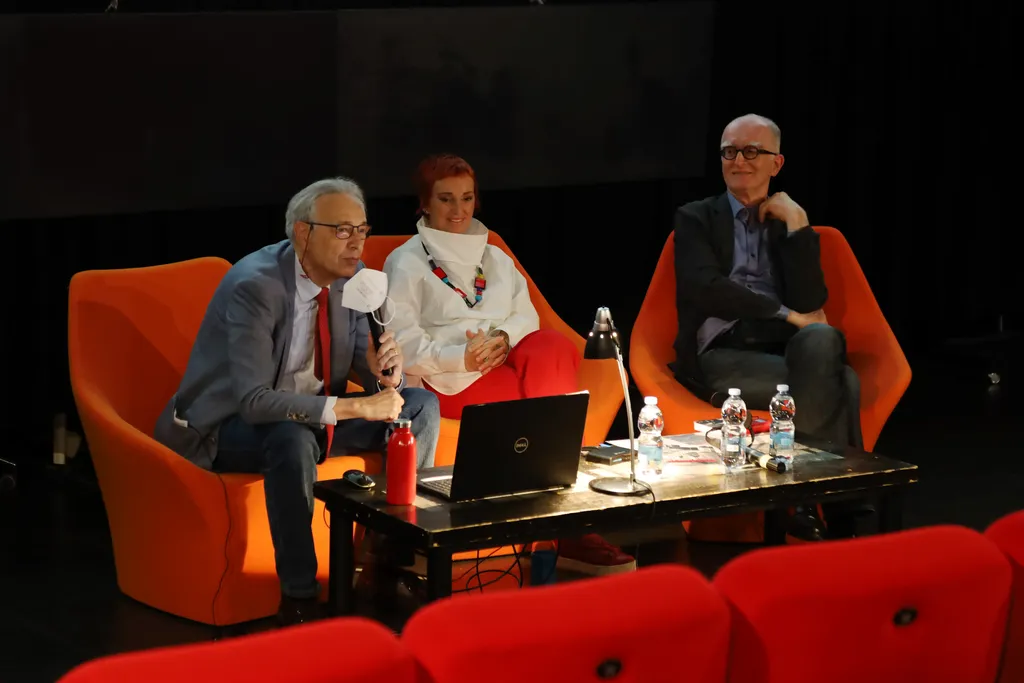Raoul Pupo, Katja Hrobat Virloget: War and Peace, Consequences for the Population
During the symposium East - West Border through film and history in 2022, the historian Raoul Pupo and the anthropologist Katja Hrobat Virloget gave interesting lectures, in which they presented their own professional points of view about the problem of the post-war resettlement of peoples in the area of Istria, the specific political situation, and the propaganda motives of the parties involved, which were also reflected in the contemporary film production, both in documentaries and in feature films.
Raoul Pupo is a historian from Trieste and an associate professor at the Department of Political and Social Sciences at the University of Trieste, who also became a member of the mixed Italian-Croatian and Italian-Slovenian historical-cultural commission in 1996. He devoted many publications to the subject of the Istrian exodus and the reconstruction of the historical and political events in the Free Trieste Territory, paying special attention to the analysis of the population involved in this situation.
Katja Hrobat Virloget is an archaeologist, ethnologist and cultural anthropologist who works as an associate professor and research associate at the Faculty of Humanities at the University of Koper. As an expert, she has been researching the so-called exodus and the resulting immigration to Istria ever since her postdoctoral project in 2012. In 2021, she summarized her research work in the book In the Silence of Memory - "Exodus" and Istria. In the monographic publication, through the experiences and memories of various individuals, the author questions, above all, the voluntary nature of migration from coastal cities and the wider Primorska area after 1945. In doing so, she shows how the "voluntary" decision of that time was largely social-historical, political-economic and also otherwise conditioned.
Announcements/
Cinema in Udine
07. 01. 2025To discuss the history of cine-club culture in Udine, one must start with Guido Galanti, who in 1930 founded Cine Club Udine—the third cine-club in Italy in chronological order. Alongside him, Renato Spinotti (Dante Spinotti’s uncle) must also be mentioned. In 1934, Cine Club produced the 16mm medium-length film Giornate di sole (Sunny Days), a comedy directed and performed by Galanti, with cinematography by Spinotti. The opening title card featured a hand-drawn depiction of the angel on Udine’s hill and the inscription “La Galanti Film presenta” (Galanti Film Presents). Author: Giorgio Placereani
Trieste – The World in One City
07. 01. 2025Today I will attempt to summarize the development of cinematic culture in Trieste. I will discuss some well-known facts, such as the favourable view of cinema held by Trieste’s writers and intellectuals, or the city’s role as a bridge between Western and Eastern cinema. However, I also want to highlight a less discussed aspect: the presence of women in Trieste’s cinematic culture over the years. Author: Paolo Lughi
Retrospective East/West
27. 11. 2024The East/West Retrospective is part of the official program for the European Capital of Culture GO! 2025. The project aims to reveal the rich cinematic heritage of the cross-border region between Slovenia and Italy to European audiences. The filmography of this region, which explores life along the Slovenian-Italian border, challenges the conventional perception of borders as mere divisions, instead portraying them as vibrant spaces of transition, exchange, and connection.


